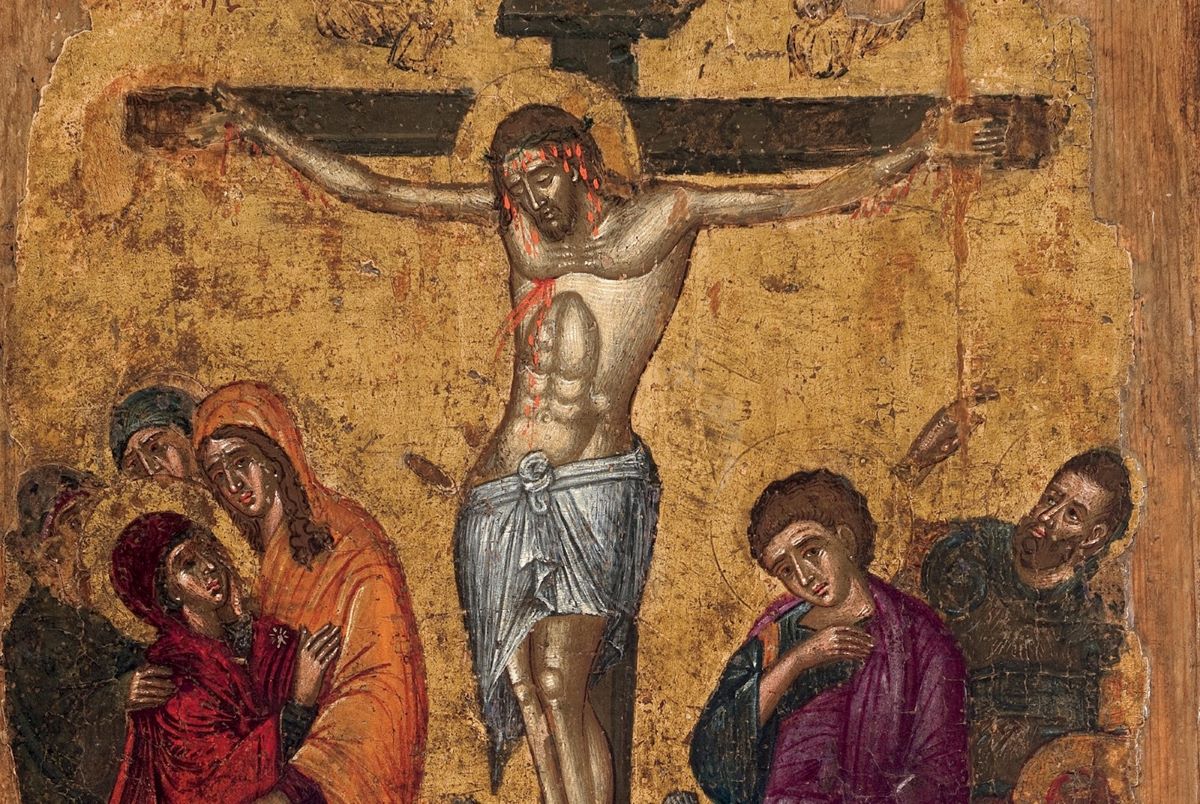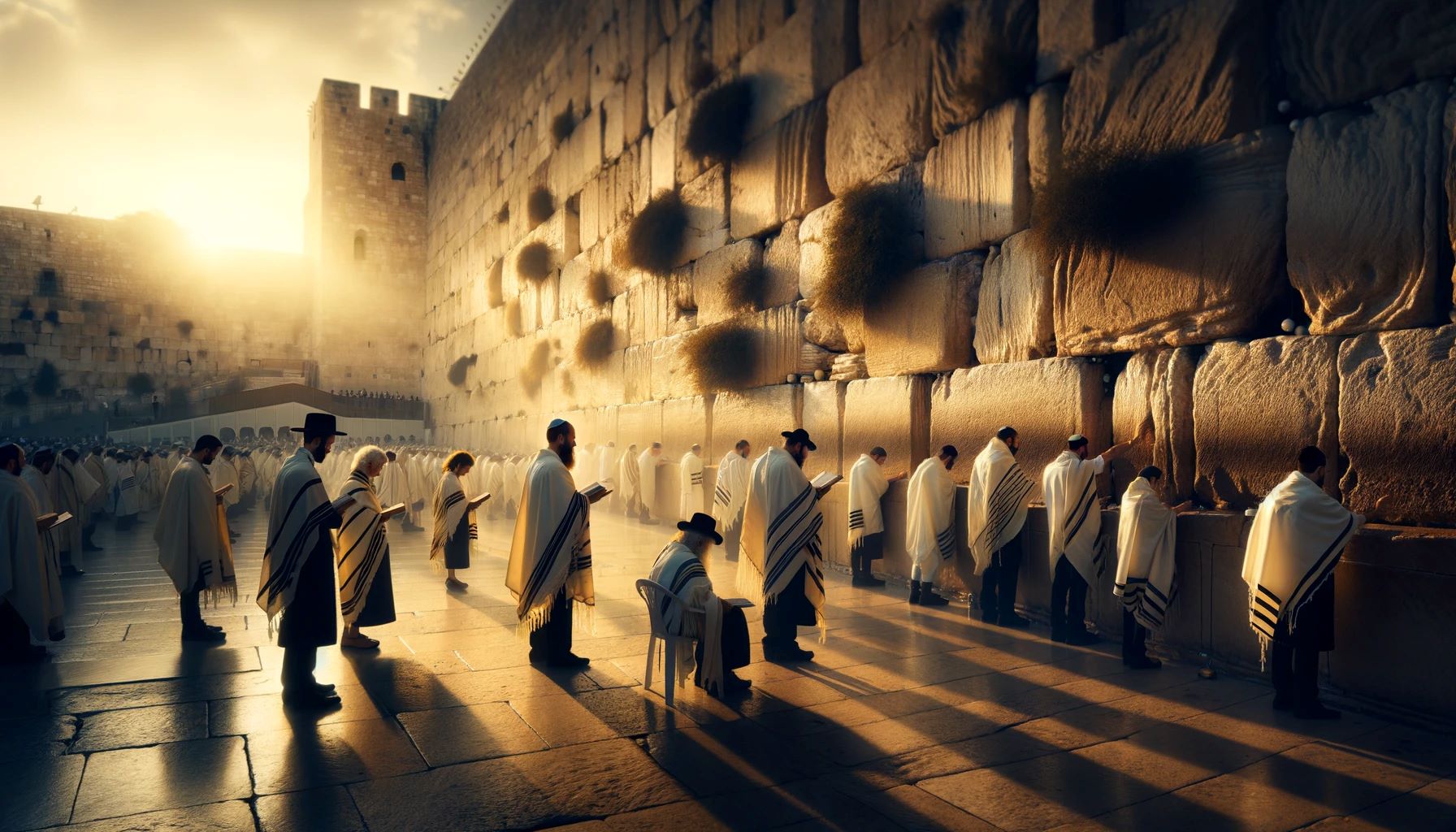Home>Theology and Spirituality>How Does The Death Of Tzadikim Bring Atonement To Their Generation


Theology and Spirituality
How Does The Death Of Tzadikim Bring Atonement To Their Generation
Published: February 10, 2024
Ericka Andersen, an editor at Christian.net, expertly merges digital strategy with content creation, focusing on faith and societal issues. Her communication skills enhance the platform's engaging narratives, fostering meaningful dialogue on belief's impact on society.
Discover the profound theology and spirituality behind how the death of tzadikim brings atonement to their generation. Explore the spiritual significance and impact of this timeless concept.
(Many of the links in this article redirect to a specific reviewed product. Your purchase of these products through affiliate links helps to generate commission for Christian.net, at no extra cost. Learn more)
Table of Contents
Introduction
The concept of atonement holds profound significance in various religious and spiritual traditions. In Judaism, the notion of atonement is deeply intertwined with the lives and legacies of Tzadikim, or righteous individuals. The death of Tzadikim is believed to have a profound impact on their generation, bringing about atonement and spiritual elevation.
The understanding of how the death of Tzadikim brings atonement to their generation is rooted in the rich tapestry of Jewish theology and spirituality. It encompasses the belief in the righteous individuals' unique connection to the divine and their ability to intercede on behalf of their generation, even after their passing.
Throughout history, the lives of Tzadikim have served as beacons of inspiration, guiding and uplifting their communities through their exemplary conduct, wisdom, and devotion to God. Their departure from the earthly realm is not viewed as the end, but rather as a transition to a higher state of existence, from which they continue to influence and impact the spiritual landscape of their generation.
As we delve into the profound interplay between the death of Tzadikim and atonement, we embark on a journey that illuminates the timeless wisdom and spiritual depth inherent in Judaism. This exploration invites us to contemplate the enduring legacy of the righteous and their enduring impact on the spiritual fabric of the world.
Read more: How Is Atonement Accomplished
Understanding the concept of Tzadikim in Judaism
In Judaism, the term "Tzadik" holds a profound and revered significance. A Tzadik, often translated as a "righteous person," embodies a spiritual archetype of exemplary virtue, piety, and devotion to God. The concept of Tzadikim is deeply rooted in Jewish tradition and theology, reflecting the belief in individuals who embody the highest moral and ethical standards while maintaining a close and intimate relationship with the divine.
Tzadikim are regarded as spiritual leaders and guides within their communities, revered for their wisdom, compassion, and unwavering commitment to upholding the teachings of the Torah. Their lives serve as a testament to the transformative power of faith and righteous conduct, inspiring others to emulate their dedication to God and their fellow human beings.
Central to the concept of Tzadikim is the belief in their ability to intercede on behalf of their communities and the broader world. Their prayers and spiritual influence are seen as potent forces for bringing blessings, healing, and divine favor to those in need. This intercessory role underscores the profound impact that Tzadikim have on the spiritual well-being of their generation, as they serve as conduits for divine grace and mercy.
Moreover, Tzadikim are not solely defined by their individual righteousness; they are also seen as embodying the collective merit of their people. Their spiritual elevation and closeness to God are believed to benefit the entire community, serving as a source of blessing and protection for all who are connected to them.
The concept of Tzadikim in Judaism reflects a deep understanding of the interconnectedness of individuals within the broader tapestry of the community. Their presence is a source of spiritual strength and inspiration, offering hope and guidance to those who seek to deepen their own relationship with God and live a life of moral integrity.
In essence, the concept of Tzadikim in Judaism encapsulates the embodiment of divine virtues in human form, serving as beacons of light and righteousness in a world that yearns for spiritual guidance and moral exemplars. Their profound impact extends beyond their individual lives, shaping the spiritual landscape of their generation and beyond, and providing a timeless model of devotion and service to God.
The significance of the death of Tzadikim in bringing atonement
The significance of the death of Tzadikim in bringing atonement is deeply rooted in the spiritual dynamics of Jewish tradition. According to Jewish belief, the passing of a Tzadik holds profound implications for the spiritual welfare of their generation. It is believed that the righteous individuals, even in death, continue to exert a transformative influence, particularly in the realm of atonement.
The concept of atonement, known as "teshuvah" in Hebrew, is central to Jewish theology. It encompasses the process of repentance, returning to God, and seeking forgiveness for transgressions. The death of a Tzadik is viewed as a catalyst for collective atonement, serving as a powerful impetus for spiritual renewal and reconciliation with the divine.
The spiritual legacy of Tzadikim transcends the boundaries of earthly existence, as their departure is seen as a transition to a heightened state of spiritual influence. Their righteous deeds, prayers, and unwavering commitment to God during their lifetime continue to reverberate in the spiritual realm, impacting the fate of their generation.
The death of a Tzadik is believed to open channels of divine mercy and compassion, facilitating the process of atonement for the community. Their departure is not perceived as a loss, but rather as a continuation of their sacred mission to uplift and guide their generation towards spiritual wholeness.
Furthermore, the passing of a Tzadik is seen as a time of heightened spiritual potency, during which the collective prayers and supplications of the community are amplified. It is believed that the righteous individuals, even in their transition to the afterlife, advocate on behalf of their generation, beseeching God for forgiveness and mercy.
In essence, the death of Tzadikim is intricately linked to the concept of atonement, serving as a spiritual catalyst that ignites the flames of repentance and reconciliation. Their enduring impact transcends the limitations of mortal existence, shaping the spiritual destiny of their generation and paving the way for divine favor and forgiveness.
The significance of the death of Tzadikim in bringing atonement underscores the timeless influence of the righteous and their pivotal role in fostering spiritual renewal and reconciliation with the divine.
Examples of Tzadikim and their impact on their generation
Throughout Jewish history, numerous Tzadikim have left an indelible mark on their generation, embodying the timeless virtues of righteousness, compassion, and unwavering devotion to God. Their lives serve as compelling examples of the profound impact that Tzadikim have had on their communities and the broader world, shaping the spiritual landscape and inspiring generations to come.
One such exemplary Tzadik is Rabbi Yisrael Meir Kagan, also known as the Chofetz Chaim. Born in 1838 in present-day Belarus, the Chofetz Chaim dedicated his life to the study and dissemination of ethical teachings and the laws of proper speech, known as "shemirat halashon." His profound commitment to promoting harmony and ethical conduct within the Jewish community earned him widespread reverence. The Chofetz Chaim's teachings continue to resonate across generations, emphasizing the transformative power of words and the imperative of cultivating a culture of kindness and integrity.
Another towering figure in Jewish history is Rabbi Abraham Joshua Heschel, a renowned theologian, philosopher, and civil rights activist. Born in Poland in 1907, Rabbi Heschel's impassioned advocacy for social justice and his profound spiritual insights left an indelible impact on his generation. His unwavering commitment to combating injustice and promoting interfaith understanding continues to inspire individuals worldwide, transcending cultural and religious boundaries.
Furthermore, the spiritual legacy of the Baal Shem Tov, the founder of Hasidic Judaism, reverberates through the annals of Jewish history. Born in 1698 in Ukraine, the Baal Shem Tov's teachings emphasized the accessibility of spirituality and the potential for divine connection in every facet of life. His profound impact on Jewish mysticism and devotion to God ignited a spiritual renaissance, uplifting the hearts and souls of countless individuals and revitalizing the spiritual vitality of his generation.
These examples illustrate the enduring influence of Tzadikim on their generation, transcending temporal boundaries and shaping the spiritual consciousness of their communities. Their lives serve as a testament to the transformative power of righteousness, compassion, and unwavering dedication to God, inspiring individuals to strive for spiritual excellence and moral integrity.
The impact of Tzadikim on their generation extends far beyond their individual lifetimes, underscoring the timeless relevance of their teachings and the enduring legacy of their spiritual influence. Through their exemplary lives and unwavering commitment to righteousness, Tzadikim continue to illuminate the path of spiritual growth and moral upliftment, leaving an indelible imprint on the hearts and minds of all who seek to walk in their footsteps.
The spiritual legacy of Tzadikim and its effect on atonement
The spiritual legacy of Tzadikim transcends the confines of mortal existence, permeating the fabric of time and space with its enduring influence. The profound impact of Tzadikim on atonement is intricately woven into the spiritual tapestry of Judaism, shaping the collective destiny of their generation and beyond.
The spiritual legacy of Tzadikim is characterized by their unwavering commitment to righteousness, compassion, and devotion to God. Their lives serve as living testaments to the transformative power of faith and moral integrity, inspiring individuals to seek spiritual elevation and ethical conduct. Through their teachings, exemplary deeds, and profound connection to the divine, Tzadikim imprint upon the collective consciousness a legacy of spiritual excellence and moral rectitude.
The effect of Tzadikim on atonement is rooted in their unique ability to intercede on behalf of their generation, even after their passing. The righteous individuals, through their spiritual elevation and closeness to God, continue to advocate for the welfare of their community, beseeching divine mercy and forgiveness. Their prayers and supplications, infused with the collective merit of their people, serve as potent conduits for atonement, fostering spiritual renewal and reconciliation with the divine.
Furthermore, the death of Tzadikim is viewed as a time of heightened spiritual potency, during which the channels of divine grace and compassion are opened wide. Their departure from the earthly realm is not perceived as an end, but rather as a transition to a heightened state of spiritual influence, from which they continue to impact the fate of their generation. The collective prayers and supplications of the community, amplified by the spiritual presence of the Tzadikim, converge to catalyze the process of atonement, ushering in a time of divine favor and reconciliation.
The enduring effect of Tzadikim on atonement underscores the timeless relevance of their spiritual legacy, as their righteous deeds and unwavering commitment to God continue to resonate across generations. Their influence transcends temporal boundaries, shaping the spiritual destiny of their generation and paving the way for collective repentance and spiritual elevation.
In essence, the spiritual legacy of Tzadikim serves as a beacon of hope and inspiration, illuminating the path of atonement and spiritual renewal. Their effect on atonement reflects the profound interplay between the earthly and the divine, as their enduring influence continues to guide and uplift the hearts and souls of all who seek reconciliation with the divine.
Read more: What Does “Atonement” Mean In The Bible
Conclusion
In conclusion, the profound interplay between the death of Tzadikim and atonement illuminates the timeless wisdom and spiritual depth inherent in Judaism. The concept of Tzadikim, rooted in the embodiment of divine virtues in human form, serves as a source of spiritual strength and inspiration, offering hope and guidance to those who seek to deepen their own relationship with God and live a life of moral integrity.
The significance of the death of Tzadikim in bringing atonement underscores the enduring impact of the righteous and their pivotal role in fostering spiritual renewal and reconciliation with the divine. Their departure from the earthly realm is not perceived as an end, but rather as a transition to a heightened state of spiritual influence, from which they continue to impact the fate of their generation.
Throughout Jewish history, the lives of Tzadikim such as the Chofetz Chaim, Rabbi Abraham Joshua Heschel, and the Baal Shem Tov have left an indelible mark on their generation, embodying the timeless virtues of righteousness, compassion, and unwavering devotion to God. Their enduring influence transcends temporal boundaries, shaping the spiritual destiny of their communities and inspiring generations to strive for spiritual excellence and moral integrity.
The spiritual legacy of Tzadikim serves as a beacon of hope and inspiration, illuminating the path of atonement and spiritual renewal. Their effect on atonement reflects the profound interplay between the earthly and the divine, as their enduring influence continues to guide and uplift the hearts and souls of all who seek reconciliation with the divine.
In essence, the concept of Tzadikim and its impact on atonement invites us to contemplate the enduring legacy of the righteous and their enduring impact on the spiritual fabric of the world. It underscores the timeless relevance of their spiritual legacy, as their righteous deeds and unwavering commitment to God continue to resonate across generations, shaping the spiritual destiny of their generation and paving the way for collective repentance and spiritual elevation.














